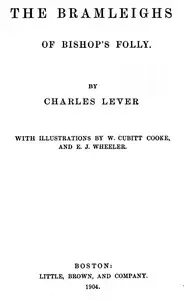"The Bishop's Apron: A Study in the Origins of a Great Family" by W. Somerset Maugham is a story set in the early 1900s that follows the Spratte family focusing on Canon Theodore Spratte's quest to become a bishop, while dealing with family drama involving his brother, Lord Spratte, and his daughter, Winnie, who is in love with a socialist named Bertram Railing. The book starts with a luncheon scene, introducing the characters and their personalities, such as the arrogant Canon Spratte and the charismatic Lord Spratte, also revealing the family's goals and power struggles, with Maugham uses humor and sharp details to show themes of ambition, family bonds, and social class.

The Bishop's Apron: A study in the origins of a great family
By W. Somerset (William Somerset) Maugham
In the early 20th century, a family's pursuit of social advancement, complicated by love and conflicting ideologies, unfolds amidst witty banter and societal expectations.
Summary
About the AuthorWilliam Somerset Maugham was an English writer, known for his plays, novels and short stories. Born in Paris, where he spent his first ten years, Maugham was schooled in England and went to a German university. He became a medical student in London and qualified as a physician in 1897. He never practised medicine, and became a full-time writer. His first novel, Liza of Lambeth (1897), a study of life in the slums, attracted attention, but it was as a playwright that he first achieved national celebrity. By 1908 he had four plays running at once in the West End of London. He wrote his 32nd and last play in 1933, after which he abandoned the theatre and concentrated on novels and short stories.
William Somerset Maugham was an English writer, known for his plays, novels and short stories. Born in Paris, where he spent his first ten years, Maugham was schooled in England and went to a German university. He became a medical student in London and qualified as a physician in 1897. He never practised medicine, and became a full-time writer. His first novel, Liza of Lambeth (1897), a study of life in the slums, attracted attention, but it was as a playwright that he first achieved national celebrity. By 1908 he had four plays running at once in the West End of London. He wrote his 32nd and last play in 1933, after which he abandoned the theatre and concentrated on novels and short stories.



















